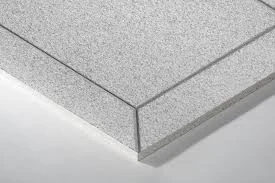Nov . 10, 2024 00:12 Back to list
Exploring the Benefits and Uses of Mineral Fiber Ceiling Tiles for Your Space
Exploring Mineral Fiber Tiles A Sustainable Option for Modern Interiors
In the realm of modern building materials, mineral fiber tiles have emerged as a popular choice for ceilings and wall applications. These tiles, made primarily from natural substances such as gypsum, perlite, and other mineral components, combine aesthetic appeal, acoustic performance, and sustainability. As architects and homeowners increasingly prioritize environmentally friendly products, mineral fiber tiles stand out as an exceptional option that balances form, function, and ecological responsibility.
What are Mineral Fiber Tiles?
Mineral fiber tiles are ceiling and wall panels made from fibers derived from natural minerals. The manufacturing process involves combining these fibers with binders and additives to enhance their strength, durability, and performance. The result is a lightweight, versatile product that can be used in a variety of settings, from residential homes to commercial buildings.
The composition of mineral fiber tiles typically includes around 70-80% mineral content, which contributes to their fire resistance and sound-absorbing properties. They can be manufactured in various textures, colors, and sizes, providing endless possibilities for design and creativity.
Advantages of Mineral Fiber Tiles
1. Acoustic Performance One of the most significant benefits of mineral fiber tiles is their excellent sound absorption capabilities. They are designed to reduce noise reverberation and improve the overall acoustics of a space, making them ideal for offices, schools, and auditoriums where sound management is crucial.
2. Fire Resistance Mineral fiber tiles are inherently fire-resistant due to their mineral composition. This quality not only contributes to the safety of a building but also helps in meeting fire code regulations, making them a smart choice for commercial applications.
mineral fiber tile

3. Sustainability In an era where environmental impact is at the forefront of many purchasing decisions, mineral fiber tiles shine as a sustainable building material. Many manufacturers prioritize using recycled materials and eco-friendly production methods, leading to a reduced carbon footprint. Additionally, mineral fiber tiles can improve energy efficiency by providing thermal insulation, contributing to lower energy costs.
4. Versatility The design versatility of mineral fiber tiles allows them to seamlessly integrate into various architectural styles. They can be installed in lay-in grids for drop ceilings, mounted directly on walls, or shaped to create unique, eye-catching designs. Their ability to be cut and shaped easily makes them favorable for custom installations in both residential and commercial spaces.
5. Low Maintenance These tiles are easy to clean and maintain, requiring only periodic dusting or the use of a mild detergent for stains. Their durability ensures that they do not sag or warp over time, maintaining their appearance and performance without frequent replacement.
Applications of Mineral Fiber Tiles
Mineral fiber tiles are used extensively across various sectors. In educational institutions, they enhance the learning environment by providing better sound management for classrooms. In healthcare facilities, their fire-resistant and hygienic properties make them a practical choice for waiting rooms, treatment areas, and operating theaters. Additionally, these tiles are popular in offices, where they contribute to a professional atmosphere while promoting employee well-being through effective noise control.
Conclusion
As the demand for sustainable building practices continues to rise, mineral fiber tiles illustrate the potential of eco-friendly materials in contemporary design and construction. Their combination of aesthetic flexibility, acoustic performance, fire resistance, and low maintenance makes them an attractive option for both residential and commercial projects.
Choosing mineral fiber tiles not only supports a commitment to sustainable architecture but also embraces a forward-thinking approach to interior design. As architects, builders, and homeowners seek to create spaces that are not only beautiful but also safe and environmentally responsible, mineral fiber tiles represent a smart, stylish, and sustainable choice for the modern world.
-
Durable Ceiling T Grid Systems | Easy InstallationNewsAug.29,2025
-
PVC Gypsum Ceiling: Durable, Laminated Tiles for Modern SpacesNewsAug.28,2025
-
Pvc Gypsum Ceiling Is DurableNewsAug.21,2025
-
Mineral Fiber Board Is DurableNewsAug.21,2025
-
Ceiling Tile Clip Reusable DesignNewsAug.21,2025
-
Ceiling T Grid Modular DesignNewsAug.21,2025







